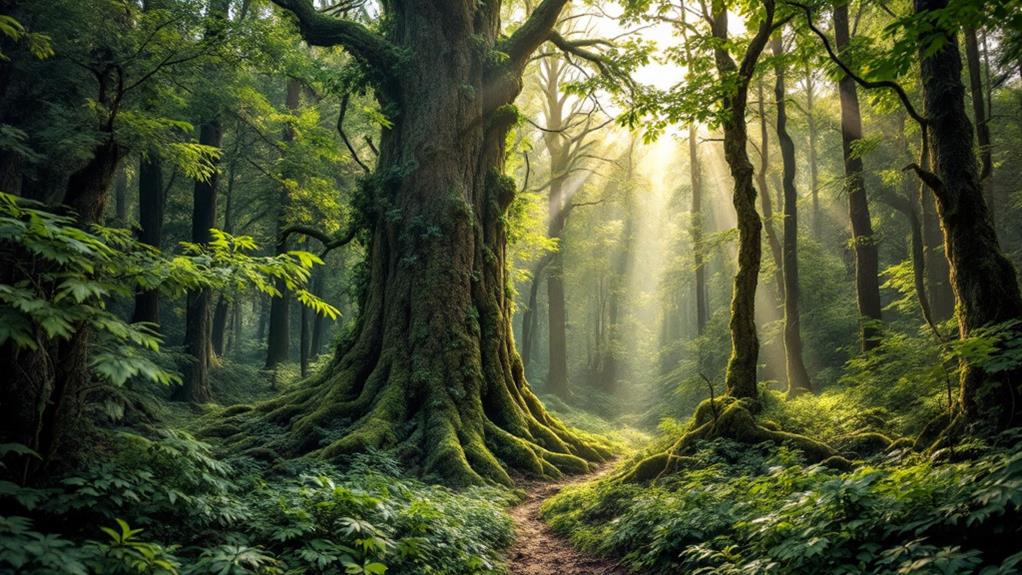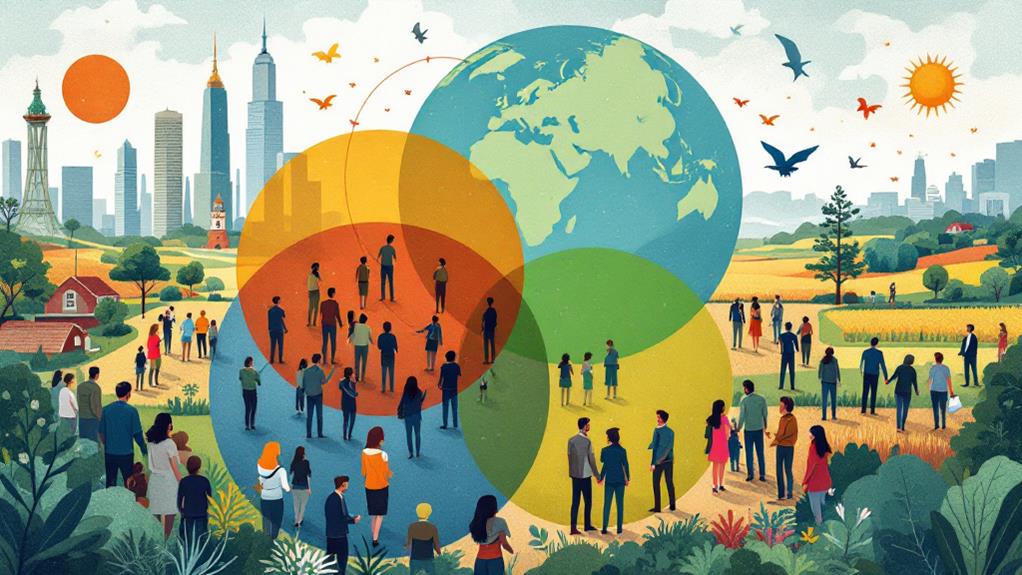The History of Ecology: Understanding the Relationships Between Organisms and Environments
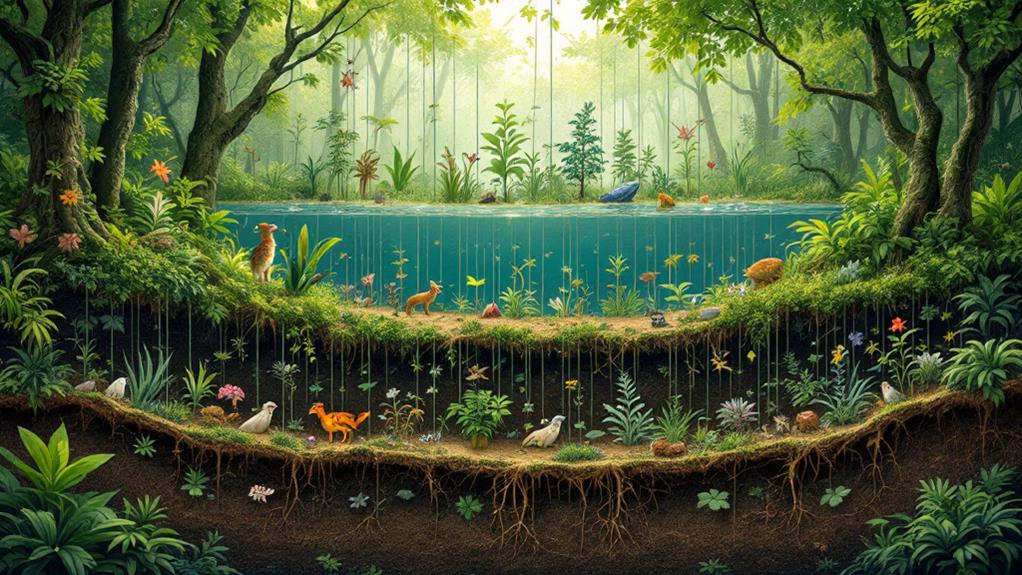
Ecology's roots stretch back to ancient civilizations, where reverence for nature and observations of environmental patterns laid the groundwork. As exploration boomed, natural historians cataloged species and developed classification systems. The 20th century saw ecology emerge as a distinct science, introducing key concepts like food webs and ecosystem dynamics. Modern ecology employs sophisticated quantitative methods and computer models to understand complex interactions. Conservation movements have grown alongside ecological knowledge, addressing environmental challenges. Today, ecologists tackle issues like climate change, urban sustainability, and biodiversity loss. Plunge further to uncover how this field continues to transform our understanding of life on Earth.
Ancient Roots of Ecological Thought
Frequently overlooked, the roots of ecological thought stretch back to ancient civilizations. You'll find that early environmental philosophies emerged in various cultures worldwide, long before ecology became a formal scientific discipline.
In ancient Egypt, you'd have seen reverence for the Nile's annual flooding cycle, which shaped their grasp of natural rhythms. Meanwhile, in China, Taoist concepts of harmony between humans and nature laid the groundwork for ecological thinking.
Classical Greek thought played a critical role in developing early ecological ideas. You'd recognize Aristotle's work on animal classification and behavior as foundational to modern ecology. His student, Theophrastus, made significant contributions to plant geography and ecology, earning him the title "father of botany."
In the Americas, indigenous cultures developed sophisticated ecological knowledge, often intertwining it with spiritual beliefs. You'd observe this in their sustainable agricultural practices and deep understanding of local ecosystems.
These ancient roots of ecological thought demonstrate that humans have long sought to understand their relationship with the environment. They've provided a rich foundation for the modern science of ecology you know today.
Natural History and Early Biology
Natural history and early biology often intertwined as precursors to modern ecology. As you immerse into this period, you'll find that naturalists and biologists made significant progress in understanding the natural world through meticulous field observations and careful documentation.
During the 16th to 19th centuries, you'd have witnessed a surge in exploration and cataloging of flora and fauna. Naturalists like Carl Linnaeus developed classification systems, laying the groundwork for future ecological studies. You'd have seen the emergence of biogeography, with figures like Alexander von Humboldt mapping plant distributions across different regions.
Charles Darwin's theory of evolution by natural selection revolutionized natural world understanding, emphasizing the interconnectedness of species and their environments. You'd have noticed how this theory sparked new questions about species interactions and adaptations.
As you study this era, you'll find that early ecologists began to focus on population dynamics and community interactions. Ernst Haeckel, who coined the term "ecology" in 1866, emphasized the study of organisms in relation to their environment. These foundations set the stage for the development of ecology as a distinct scientific discipline in the 20th century.
Emergence of Modern Ecological Concepts
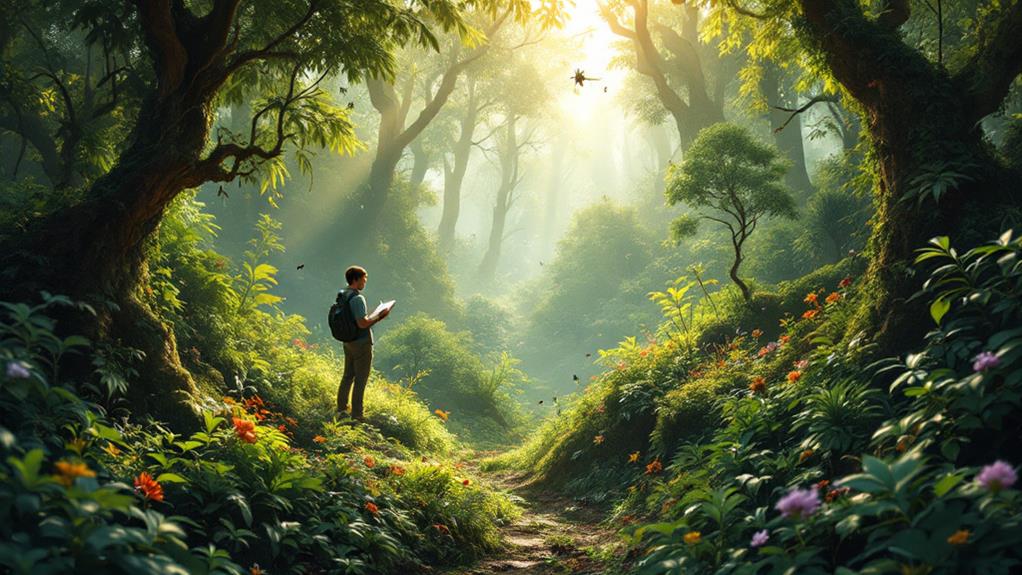
As the 20th century dawned, you'd have seen ecology transforming into a distinct scientific discipline with its own set of modern concepts. This period marked a shift from descriptive natural history to a more analytical and experimental approach.
You'd notice the emergence of key ecological principles, such as food webs, energy flow, and population dynamics. Ecologists began developing theoretical frameworks to explain complex interactions within ecosystems. The concept of succession, introduced by Henry Cowles and further developed by Frederic Clements, became central to understanding how communities change over time.
Interdisciplinary connections flourished as ecology drew observations from fields like physics, chemistry, and mathematics. You'd observe the rise of systems thinking, with ecologists viewing ecosystems as interconnected networks of organisms and their environments.
The work of G. Evelyn Hutchinson and Raymond Lindeman in the mid-20th century would catch your attention. They introduced the concept of trophic levels and energy transfer, revolutionizing our understanding of ecosystem functioning. These advances laid the groundwork for modern ecological theories and paved the way for addressing complex environmental challenges in the decades to come.
Ecosystem Theory and Systems Thinking
The development of ecosystem theory and systems thinking marked a vital shift in ecological research. You'll find that this approach revolutionized how scientists viewed the natural world, emphasizing the interconnectedness of living and non-living components within ecosystems.
Ecosystem theory introduced the concept of energy flow through trophic levels, highlighting how energy is transferred from producers to consumers and decomposers. You'll recognize this as a fundamental principle in understanding ecosystem dynamics. Additionally, the theory emphasized nutrient cycling, explaining how essential elements like carbon, nitrogen, and phosphorus move through biotic and abiotic components of an ecosystem.
Systems thinking encouraged you to assess ecosystems as complex, changeable entities with feedback loops and emergent properties. This standpoint allowed for a more all-encompassing understanding of ecological processes and their interactions. You'll notice that it also facilitated the development of mathematical models and computer simulations to predict ecosystem behavior.
Quantitative Methods in Ecology
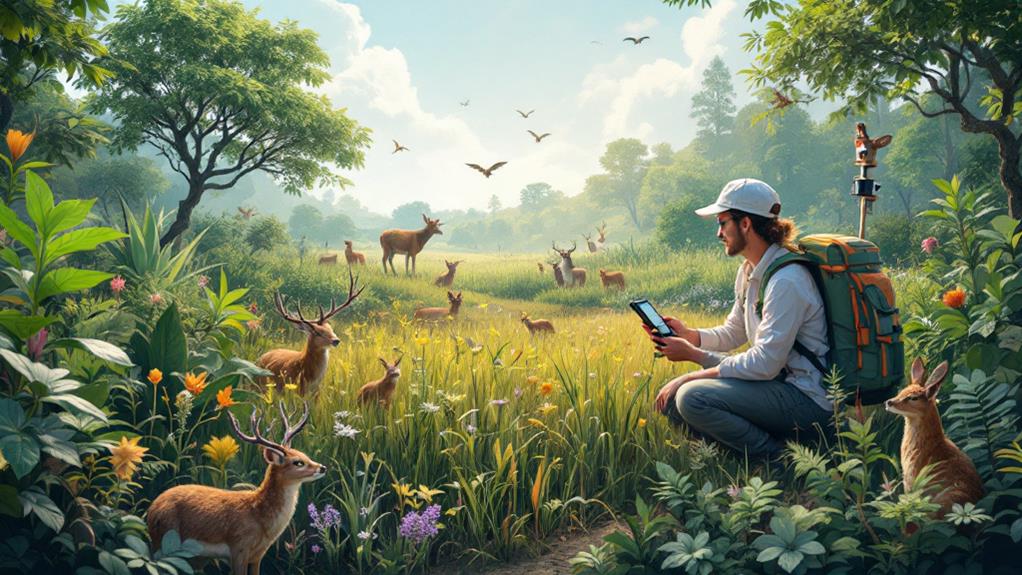
Throughout the course of ecological research, quantitative methods have become increasingly essential for understanding complex environmental systems. You'll find that these methods have revolutionized the way ecologists collect, analyze, and interpret data. By employing advanced sampling techniques and statistical modeling, researchers can now uncover patterns and relationships that were previously hidden.
When exploring quantitative methods in ecology, you'll encounter:
- Population dynamics models
- Multivariate statistical analyses
- Remote sensing and GIS applications
- Machine learning algorithms for ecological predictions
These tools allow you to tackle complex ecological questions with unparalleled precision. You'll be able to quantify biodiversity, assess ecosystem health, and predict the impacts of environmental changes. Sampling techniques have evolved from simple quadrat surveys to sophisticated stratified sampling designs, ensuring more accurate representations of ecosystems. Statistical modeling has become increasingly sophisticated, enabling you to account for multiple variables and their interactions simultaneously.
As you dive deeper into ecological research, you'll find that mastering these quantitative methods is vital for conducting rigorous studies and contributing meaningful viewpoints to the field. They're not just tools; they're the foundation of modern ecological understanding.
Conservation and Environmental Movements
While quantitative methods revolutionized ecological research, a parallel movement was taking shape in the public sphere. You've likely heard of conservation and environmental movements, which gained momentum in the mid-20th century. These grassroots efforts aimed to protect natural resources and raise awareness about human impacts on ecosystems.
As you investigate this topic, you'll find that early conservationists like John Muir and Aldo Leopold laid the groundwork for modern environmentalism. Their writings inspired generations to appreciate and protect wilderness areas. In the 1960s and 1970s, you'd have witnessed a surge in environmental activism, fueled by Rachel Carson's "Silent Spring" and growing concerns about pollution and habitat loss.
Today, you're living in an era where sustainability initiatives are becoming mainstream. Companies and governments are increasingly adopting green economy principles, recognizing the need to balance economic growth with environmental protection. You'll notice that conservation efforts now extend beyond preserving pristine wilderness to restoring degraded ecosystems and promoting sustainable resource use in urban and rural areas alike.
Future Directions in Ecological Research

Several emerging trends are shaping the future of ecological research. You'll see a growing focus on integrating technological advancements into ecological studies. From remote sensing to artificial intelligence, these tools are revolutionizing data collection and analysis. Interdisciplinary collaborations are becoming increasingly vital, as ecologists team up with experts from fields like chemistry, genetics, and social sciences to tackle complex environmental challenges.
As you look ahead, you'll notice four key areas that are likely to dominate ecological research:
- Climate change impacts and adaptation strategies
- Urban ecology and sustainable city planning
- Restoration ecology and ecosystem rehabilitation
- Biodiversity conservation in the face of habitat loss
You'll find that these areas often overlap, requiring a comprehensive approach to research. As an ecologist, you'll need to welcome new technologies and collaborative opportunities to stay at the forefront of the field. By doing so, you'll contribute to our understanding of ecosystems and help develop solutions for pressing environmental issues. The future of ecological research is dynamic and exciting, offering countless opportunities for exploration and innovation.

